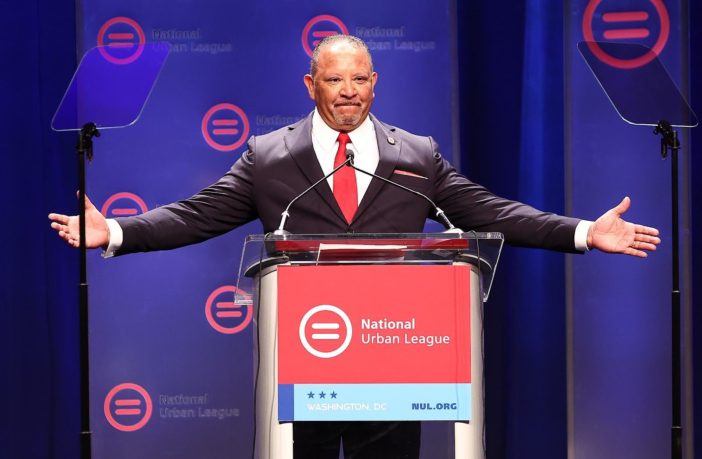For many, Marc Morial will forever be known as one of New Orleans’ most impactful mayors. Some even recall his game-changing days in the Louisiana State Legislature. Others know him for his prowess in the courtroom as a take-no-prisoners lawyer. But history will certainly record the work Morial has done over the past two decades as head of one of the nation’s most historic civil rights and urban advocacy organizations, the National Urban League (NUL).
During those 20 years, Morial has transformed the NUL into an organization that is even more formidable today than it was at its founding in 1910.
“We’re unique amongst those who do this work in that we do advocacy and direct services,” said Morial. “Our direct services involve serving people literally from cradle all the way until they’re seasoned citizens, through job training, afterschool programs, homebuyer education, workforce development, entrepreneurship initiatives, and the like.”
The Defender spoke with Morial, who is also a best-selling author and former Louisiana state legislator, about his 20-year tenure over the NUL and its network of 93 affiliates across the nation as the organization prepares for its annual conference in Houston July 26 – 29.
DEFENDER: You’ve served as the NUL’s leader for 20 years now. First, does it feel like 20 years, and second, what are you most proud of during your tenure?
MARC MORIAL: It doesn’t feel like 20 years. Sometimes I feel like I just got started. But in truth and in fact, I’m proud that I think I’ve met the moment and met the challenge. The challenge was to transform the National Urban League. I wasn’t hired as a caretaker. I wasn’t hired to maintain the status quo. I was hired to transform and bring about change. And I think we have. In many ways, we’ve overhauled all of our programs. We’re much more assertive and aggressive in our advocacy. Our research project, The State of Black America, has expanded significantly. We have a new generation of leaders, both in the young professionals and at the local level. We have a new generation of staff. We have embraced technology and reach literally millions of people every week through social media and through our technology tools. So, we’re a transformed organization I think prepared for the remainder of the 21st century.
DEFENDER: Do you have like one specific moment or achievement that stands out to you over your tenure?
MARC MORIAL: It’s hard to pick any single one, to be honest with you, because there’ve been so many high points. And I’ve also had a chance to lead through a time of crisis and Trump. The election of Barack Obama stands out. The idea that the nation would elect an African-American president was unimaginable. The day that I started as president of this organization, the idea that my beloved hometown would be almost wiped out by a hurricane, that we’d have a great recession, almost as great as the Great Depression or COVID pandemic. But then all of the work that we did to respond. Every crisis, we responded. Our services responded. Our advocacy responded. And I’m proud of the fact that in every case, whether it’s Katrina, the Great Recession, COVID, we pivoted and responded and served people, and were a voice demanding a governmental response, as well. So, I am proud of that. But I think I’m also excited about ushering in a new generation of leaders. This is not your grandfather and your grandmother’s Urban League. But we stand on their shoulders. But we are different because we’re 21st century-focused in many ways.
DEFENDER: What’s been the biggest shift on the national scene that you’ve seen over your 20-year NUL tenure?
MARC MORIAL: I think the Black Lives Matter movement and the rise of activism, the authentic activism and the way in which people more candidly speak about race is a change. I think it’s refreshing. I think it’s healthy, and I hope it continues. I think people historically have been guarded in talking about race and talking about things like institutional racism or reparations for fear of a backlash, for fear of being misunderstood. There’s a greater authenticity about that today, and I think young people help to drive his new day. Secondly, the role of technology, which we are really just beginning to understand in every aspect of our life. Email, communications, social media, the way in which we connect with jobs and government services online, this is radically different from the way it was 20 years ago.
When I joined 20 years ago, email was relatively new. And you could send cryptic emails, but no one had cell phones. And people had big wonky computers or big, wonky laptops. Technology has been transformative and it’s been transformed from what people many times thought was a nicety or a luxury to a necessity and a must-have. So, every element of American life [has been impacted]. I am speaking to you remotely. I’m using a technology called Zoom. I’m using a device called an iPhone. We couldn’t have done that 20 years ago. We couldn’t have done it 10 or 15 years ago. It’s transformative. I’d been on the phone with you, or I’d have tried to fly down to Houston to see you. That is remarkable.
ABOUT MARC MORIAL
Birthplace: New Orleans
Education: University of Pennsylvania, Georgetown University Law Center
Previous Positions: Mayor, New Orleans; State Legislator, Louisiana; Practicing Attorney.



